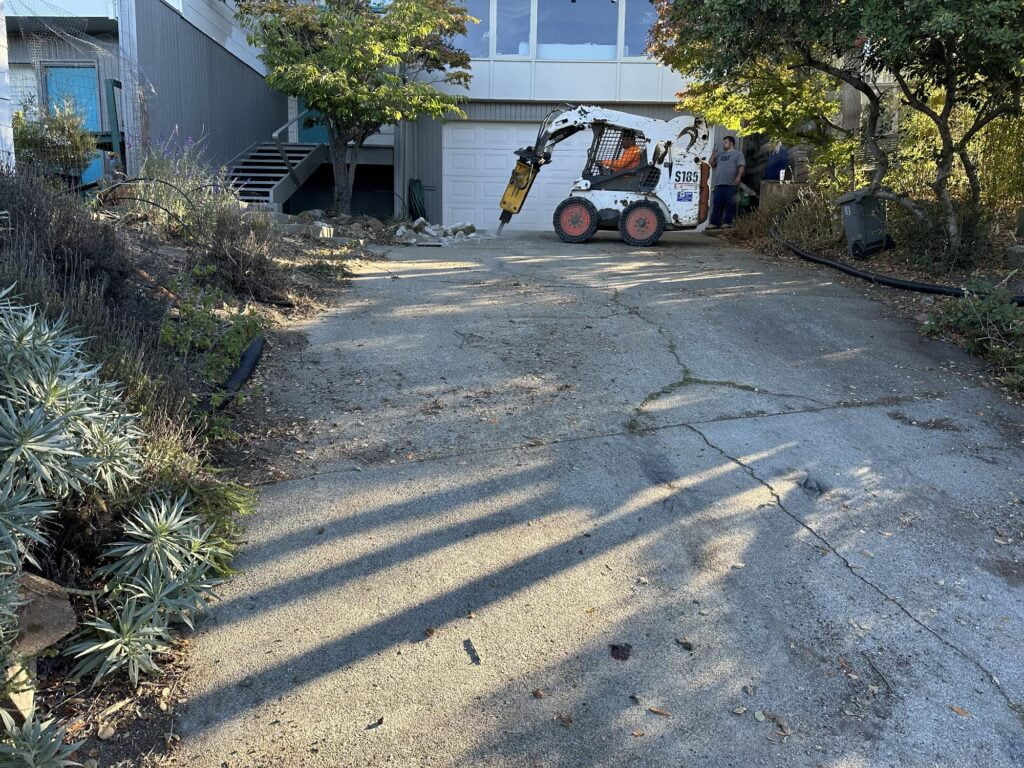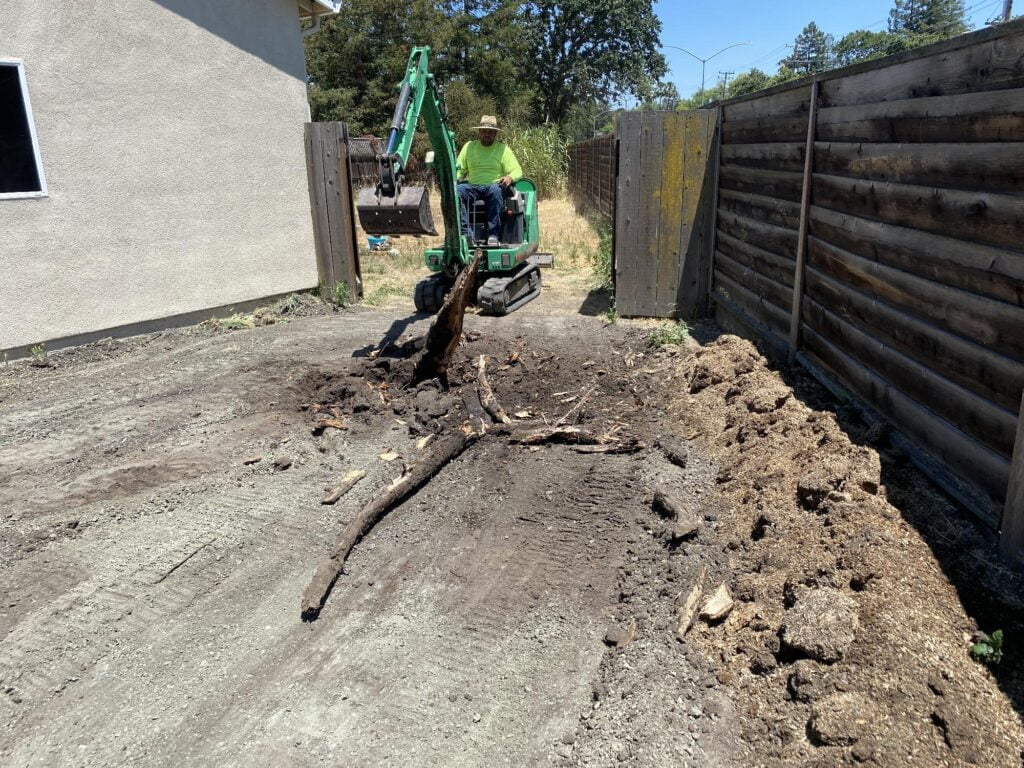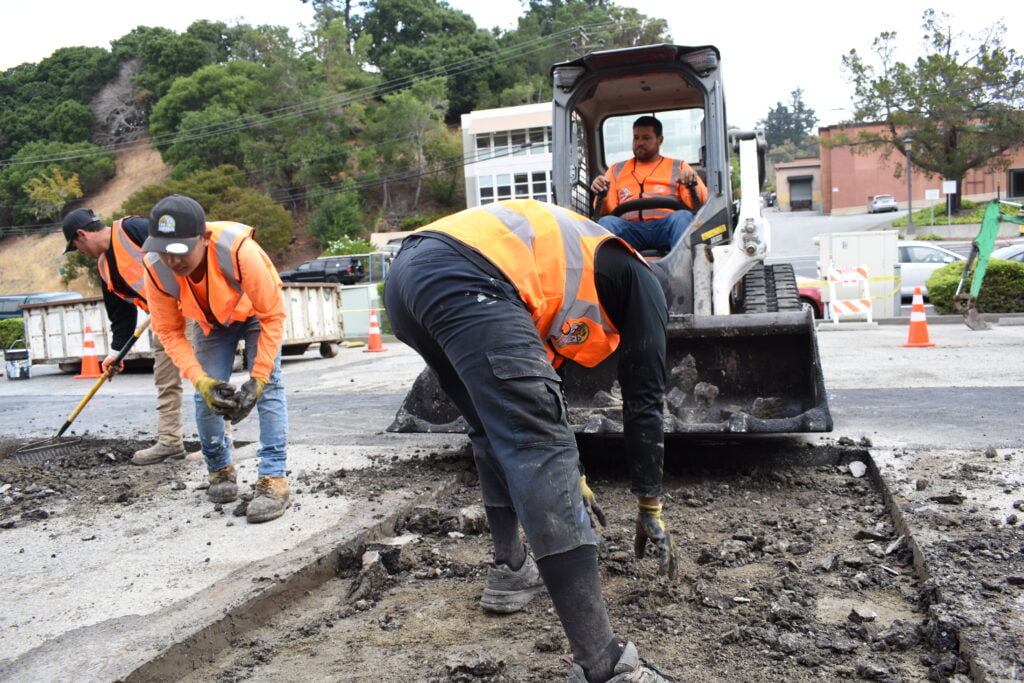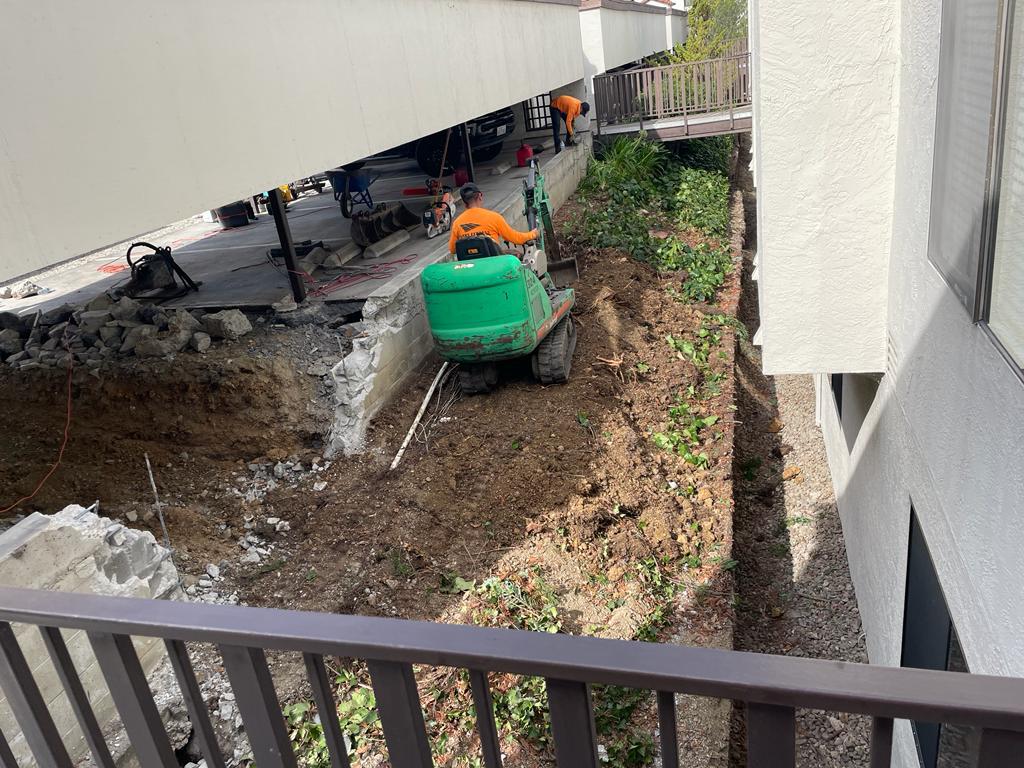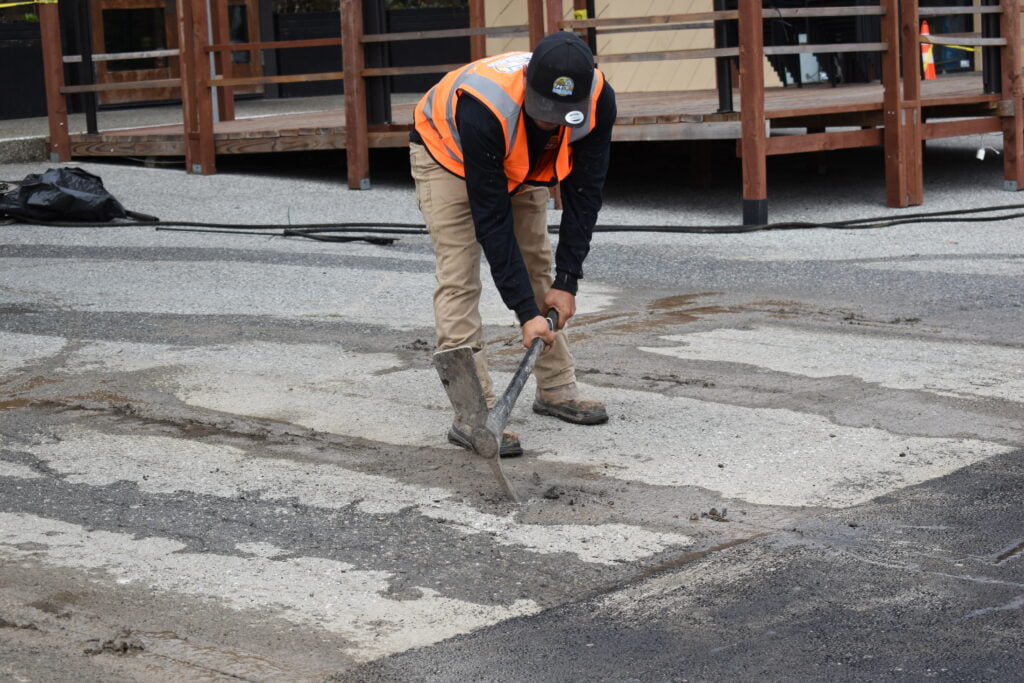- 415-774-6424
- htpavingco@yahoo.com
- License Number: 1112332
Asphalt Excavation Services
WHAT IS IT?
“Excavation” refers to the process of digging, removing, and clearing soil, rock, or other materials from a designated area to create a depression, hole, trench, or cavity in the ground. Excavation is a common activity in various industries and applications, including construction, mining, agriculture, archaeology, and environmental engineering. It serves several purposes, depending on the specific context
Contexts for excavation
Here are some contexts where excavation can be carried out
1.
Construction
In the construction industry, excavation is a fundamental step in preparing a site for building structures such as houses, commercial buildings, roads, bridges, and foundations. Excavation may involve digging trenches for utilities (e.g., water pipes, sewer lines), creating basements, or shaping the terrain for landscaping.
2.
Mining
In mining operations, excavation is the process of removing ore, minerals, or valuable materials from the earth’s crust. This can involve the creation of large pits, tunnels, and underground chambers to access and extract valuable resources.
3.
Environmental Engineering
Excavation is sometimes required for environmental remediation projects, such as the removal of contaminated soil or the construction of retention ponds to manage stormwater runoff and prevent pollution.
Expert Asphalt Excavation Services & Tips
When it comes to paving projects, the success lies not only in the quality of the asphalt but also in the meticulousness of the excavation process. Expert asphalt excavation is the key to achieving flawless paving outcomes that stand the test of time. But what exactly makes asphalt excavation so crucial?
In this article, we will dive deep into the world of asphalt excavation, exploring the importance of this process in paving projects. We will unravel the secrets of professional asphalt excavation techniques, discuss necessary equipment, and provide valuable tips for ensuring quality and safety throughout the excavation process.
HT Paving and Seal Coating is here to provide expert asphalt excavation solutions that will help minimize disruption and extend the lifespan of your asphalt surfaces. Whether you’re involved in road construction or planning to renovate your driveway, understanding the intricacies of asphalt excavation will empower you to make informed decisions and achieve exceptional paving results.
Key Takeaways:
- HT Paving offers expert asphalt excavation that is essential for achieving flawless paving outcomes.
- Proper asphalt excavation contributes to a durable and high-quality pavement.
- Engaging professional asphalt paving services ensures optimal road construction.
- There are various techniques and equipment used in professional asphalt excavation.
- Safety measures and quality control are crucial during asphalt excavation.
The Importance of Asphalt Excavation in Paving Projects
Proper asphalt excavation plays a crucial role in the successful completion of paving projects. It is the foundation upon which a durable and high-quality pavement is built. Engaging professional asphalt paving services for road construction projects is essential to ensure the excavation is done correctly.
The Significance of Asphalt Excavation
Asphalt excavation goes beyond simply removing the existing pavement. It involves a meticulous process of assessing the condition of the underlying layers, identifying any issues, and preparing the surface for the new pavement. This careful excavation work sets the stage for a smooth and long-lasting asphalt paving.
During the excavation stage, the old asphalt is removed, and the underlying layers are inspected for any structural weaknesses or damages. Addressing these issues before laying the new pavement is vital to prevent future problems such as cracks, potholes, or uneven surfaces. Proper excavation also allows for effective drainage and ensures the strength and stability of the pavement.
The Role of Professional Asphalt Paving Services
Engaging professional asphalt paving services is crucial for road construction projects. These experts possess the knowledge, experience, and specialized equipment required to execute asphalt excavation with precision and efficiency. Their understanding of industry best practices ensures that every aspect of the excavation process is carried out meticulously, from initial assessment to the final preparation of the subgrade.
Professional asphalt paving services prioritize safety, quality, and compliance with industry standards. They have the necessary expertise to handle different types of excavation challenges, such as dealing with obstructions or working in confined spaces. By entrusting the asphalt excavation to professionals, you can have peace of mind knowing that the foundation for your pavement is in capable hands.
In conclusion, asphalt excavation plays a critical role in paving projects. It is the initial step that sets the stage for a durable and high-quality pavement. By engaging professional asphalt paving services, you can ensure that the excavation process is carried out effectively, mitigating potential issues and setting the foundation for a successful road construction project.
Professional Asphalt Excavation Techniques
When it comes to asphalt excavation, employing professional techniques is crucial to ensure efficient and effective results. Excavating asphalt requires precision and expertise to remove the old pavement and create a proper base for the new surface. In this section, we will explore the various techniques used by professionals in the field.
1. Excavating Asphalt
Excavating asphalt involves the systematic removal of the existing pavement. Professionals employ specialized machinery and tools to break up the asphalt, making it easier to remove and dispose of. This process ensures a clean and well-prepared base for the subsequent steps of the paving project.
2. Asphalt Digging
Digging out the old pavement is a critical step in asphalt excavation. Professionals utilize excavators and other heavy machinery to dig down to the required depth, removing the asphalt in layers. This process allows for better assessment of the underlying soil conditions and ensures a stable foundation for the new pavement.
3. Recycling Asphalt
In some cases, recycled asphalt can be used as a cost-effective and sustainable alternative during excavation projects. Professionals employ techniques to crush and mix old asphalt with new materials, creating a recycled asphalt mix that meets the required specifications. This approach reduces waste and promotes environmental responsibility.
4. Surface Preparation
Surface preparation is an essential technique in asphalt excavation. It involves removing loose debris, cleaning the area, and ensuring proper compaction. Professionals meticulously prepare the surface to ensure optimal bonding between the new pavement and the existing base, resulting in a durable and long-lasting finish.
By employing these professional asphalt excavation techniques, contractors can achieve precise and efficient results. When embarking on an asphalt excavation project, it is crucial to engage experienced professionals who understand the intricacies of the process and can deliver high-quality outcomes.
Necessary Equipment for Asphalt Excavation
In order to ensure a smooth and successful asphalt excavation process, it is essential to have the right equipment on hand. Road construction and pavement removal projects require a range of tools and machinery to effectively dig out and remove the existing asphalt. Let’s explore the necessary equipment for asphalt excavation:
1. Excavators
Excavators are heavy machinery commonly used in road construction projects. These powerful machines play a crucial role in digging out the old asphalt and preparing the site for further excavation. Excavators come in various sizes to suit different project requirements.
2. Bobcat Loaders
Bobcat loaders are compact and versatile machines that are highly effective in removing asphalt debris and transporting materials. With their maneuverability, these loaders are essential for efficiently clearing the excavation area and maintaining a tidy work site.
3. Skid Steer Loaders
Skid steer loaders are another type of heavy machinery used in asphalt excavation projects. These machines are ideal for tasks such as removing surface layers, loading material into trucks, and leveling the excavation site.
4. Rollers
Rollers are crucial equipment for compacting the base and ensuring proper compaction of the underlying soil after the asphalt removal. Vibratory rollers provide efficient compaction and help create a solid base for the new pavement.
5. Concrete Saws
Concrete saws are used to cut through the existing asphalt, making it easier to remove. These saws are equipped with diamond blades that can cut through the strongest asphalt surfaces with precision.
6. Dump Trucks
Dump trucks are essential for removing and transporting the excavated asphalt from the site. These trucks efficiently handle large quantities of debris and play a critical role in maintaining a clean work area.
By utilizing the appropriate equipment, asphalt excavation projects can be completed efficiently and effectively. Investing in the right tools and machinery ensures a smooth and successful road construction or pavement removal process, leading to quality results.
Preparing for Asphalt Excavation
Before embarking on asphalt excavation, proper preparation is crucial to ensure a smooth and successful project. Whether you are working on a driveway excavation or a larger-scale asphalt removal, following the right steps will help set the stage for efficient and effective excavation.
The first step in preparing for asphalt excavation is to remove the existing asphalt surface. This involves using specialized equipment to break up and remove the old pavement. It is important to ensure that the entire asphalt layer is removed, including any sub-base materials, to create a clean slate for the upcoming excavation.
Once the asphalt has been removed, the next step is to evaluate the condition of the underlying soil or subgrade. It is crucial to ensure that the subgrade is stable and properly compacted to support the new pavement. If any abnormalities or weak spots are identified, they should be addressed and properly repaired to prevent future issues.
In addition to evaluating the subgrade, it is important to plan the dimensions and layout for the new pavement. This involves measuring the area to be excavated, marking out the boundaries, and determining the proper slope and grade for adequate drainage. Correct measurements and layout planning are essential to ensure a precise excavation that meets the design specifications.
Before proceeding with the excavation itself, it is necessary to inform all relevant parties, such as utility companies, about the upcoming work. This will ensure that any underground utilities are accurately marked and located prior to excavation, minimizing the risk of accidental damage.
Lastly, it is essential to take appropriate safety measures during the preparation phase. This includes wearing personal protective equipment (PPE), such as hard hats, high-visibility vests, and safety boots, to protect workers from potential hazards. Maintaining a clean and organized work environment is also important to avoid accidents during asphalt excavation.
By properly preparing for asphalt excavation, you can lay the foundation for a successful paving project. Through careful removal of existing asphalt, evaluation of the subgrade, meticulous planning, coordination with utility companies, and adherence to safety protocols, you can ensure that your driveway or road excavation is executed with precision and efficiency.
Best Practices for Asphalt Removal
When it comes to asphalt removal, following the best practices is crucial to ensure a smooth and efficient process. Demolishing existing asphalt surfaces and removing debris requires careful planning and execution. By adhering to the following techniques, you can achieve a clean and well-prepared base for the new pavement:
1. Assessment and Planning
Before starting the asphalt removal, assess the condition of the existing surface. Identify any areas that may require extra attention or specialized equipment. Proper planning will help streamline the removal process and minimize any potential complications.
2. Safety Precautions
Implementing safety measures is essential during asphalt removal. This includes wearing appropriate personal protective equipment (PPE) such as safety goggles, gloves, and a dust mask. Additionally, ensure that the work area is well-marked and secure to prevent accidents and protect workers.
3. Equipment and Machinery
Choosing the right equipment and machinery is crucial for efficient asphalt removal. Consider factors such as the size of the project, accessibility, and the condition of the existing pavement. Common equipment used for asphalt removal includes excavators, jackhammers, and loaders.
4. Demolition Techniques
Various techniques can be employed to effectively demolish the existing asphalt surface. These may include saw-cutting, milling, or breaking the asphalt into manageable sections. The choice of technique will depend on the specific project requirements and the thickness of the asphalt.
5. Debris Management
Proper debris management is essential to maintain a clean and organized work environment. Dispose of the removed asphalt in accordance with local regulations and environmental standards. Consider recycling options for asphalt materials to minimize waste and promote sustainability.
6. Surface Preparation
After removing the asphalt, it is essential to prepare the surface for the new pavement. This may involve leveling the area, removing any remaining debris, and compacting the soil or sub-base. Proper surface preparation will ensure a stable foundation for the new asphalt layer.
By applying these best practices, you can facilitate a successful asphalt removal process. Remember to prioritize safety, choose the right equipment, and follow industry-standard techniques. This will result in a well-executed excavation, setting the stage for a flawless paving project.
Safety Measures during Asphalt Excavation
Safety is of the utmost importance during any asphalt excavation project. Implementing proper safety measures is crucial to ensure the well-being of workers and the smooth progression of the project. Here, we will highlight the necessary safety precautions that should be taken during asphalt excavation in road construction and pavement removal.
1. Personal Protective Equipment (PPE)
Wearing appropriate personal protective equipment is essential to minimize the risk of injuries. Workers involved in asphalt excavation should be equipped with the following PPE:
- Hard hats: Protecting the head from falling objects and overhead hazards.
- High-visibility vests: Enhancing visibility and identifying workers in hazardous areas.
- Steel-toed boots: Providing protection against heavy objects and potential foot injuries.
- Gloves: Shielding hands from cuts, burns, and other hazards.
- Eye protection: Preventing eye injuries from debris, dust, and flying particles.
- Hearing protection: Reducing the risk of hearing damage from loud machinery and equipment.
- Dust masks: Shielding against harmful dust particles and fumes.
2. Safe Work Practices
Adhering to safe work practices promotes a secure environment and reduces the likelihood of accidents and injuries. Some key safe work practices during asphalt excavation include:
- Regular safety training: Ensuring all workers are trained in proper excavation techniques and safety protocols.
- Clear communication: Establishing effective communication channels among workers and supervisors to relay safety instructions and address concerns promptly.
- Proper equipment use: Ensuring workers are trained to use the necessary equipment and machinery correctly.
- Clear signage and barriers: Marking hazardous areas with visible signs and barriers to prevent unauthorized access.
- Site inspection and hazard assessment: Conducting regular inspections and hazard assessments to identify and address potential safety risks.
- Emergency protocols: Establishing emergency response protocols and providing workers with the knowledge to respond effectively in case of accidents or incidents.
Overcoming Challenges in Asphalt Excavation
During asphalt excavation projects, several challenges can arise that may hinder the smooth progress of the paving project. However, with careful planning and the right strategies, these challenges can be effectively overcome, ensuring successful asphalt removal and driveway excavation.
1. Unforeseen Underground Obstacles
One common challenge encountered during asphalt excavation is the discovery of unforeseen underground obstacles, such as utility lines, tree roots, or buried debris. These obstacles can slow down the excavation process and pose safety risks. To overcome this challenge, it is crucial to conduct thorough surveys and inspections before starting the excavation. This will help identify any potential obstructions and enable the appropriate measures to be taken, such as redirecting utility lines or removing tree roots, to ensure a smooth excavation process.
2. Adverse Weather Conditions
Adverse weather conditions, such as heavy rain or extreme heat, can significantly impact asphalt excavation projects. Wet conditions can make the removal and excavation process more challenging, while high temperatures can cause the asphalt to become soft and difficult to remove. To overcome these challenges, it is important to monitor weather forecasts closely and schedule the excavation work during a suitable weather window. Additionally, implementing proper drainage measures can help mitigate the impact of rainfall and minimize delays caused by wet conditions.
3. Lack of Proper Equipment and Machinery
Inadequate or outdated equipment and machinery can impede the efficiency and effectiveness of asphalt excavation. Insufficient power, limited reach, or outdated technology may result in delays and subpar results. To overcome this challenge, it is crucial to invest in modern and reliable equipment specifically designed for asphalt removal and excavation. Skid steers, excavators, and asphalt cutters with precise cutting capabilities can significantly enhance productivity and ensure a smooth excavation process.
4. Safety Hazards
Asphalt excavation inherently involves safety risks for workers and the surrounding environment. Operating heavy machinery, working in confined spaces, and handling sharp tools can pose hazards if proper safety measures are not in place. To overcome this challenge, it is essential to prioritize safety by providing comprehensive training for all workers involved in the asphalt excavation project. Implementing safety protocols, such as using personal protective equipment, following proper excavation techniques, and conducting regular safety inspections, will ensure a safe working environment.
5. Cost Management
Managing costs effectively during asphalt excavation projects is crucial to ensure the overall success of the paving project. Unforeseen expenses, inaccurate project estimations, or unexpected delays can lead to budget overruns. To overcome this challenge, it is essential to conduct a comprehensive cost analysis and create a detailed budget before commencing the excavation. Regular monitoring of expenses, proactive risk management, and efficient project management practices can help control costs and mitigate potential financial challenges.
By addressing these common challenges and implementing appropriate strategies, asphalt excavation projects can proceed smoothly, ensuring successful asphalt removal and driveway excavation. Overcoming these obstacles will contribute to a seamless paving process, ultimately resulting in a durable and high-quality pavement.
Ensuring Quality in Asphalt Excavation
In the process of asphalt excavation, ensuring quality is paramount to achieve long-lasting and durable paving results. Implementing effective measures and quality control processes is crucial for a successful asphalt excavation project. Engaging professional asphalt paving services further enhances the quality of the excavation process.
The Role of Professional Asphalt Paving Services
Professional asphalt paving services play a vital role in ensuring quality throughout the excavation process. They have the expertise, experience, and specialized equipment required to achieve precise asphalt digging and excavation. These professionals understand the intricacies of the excavation process and follow industry best practices, guaranteeing meticulous results.
Quality Measures in Asphalt Excavation
Implementing specific quality measures during asphalt excavation further enhances the overall paving outcomes. These measures include:
- Proper Planning: Thoroughly assessing the project requirements, including the scope of excavation, site conditions, and any potential challenges or risks.
- Accurate Site Marking: Clearly marking the area to be excavated, ensuring precise boundaries and avoiding unnecessary disturbances to the surrounding pavement.
- Precision Excavation: Utilizing advanced equipment and skilled operators to carry out the excavation with utmost accuracy, minimizing any damage to the existing infrastructure and ensuring a well-prepared base.
- Effective Debris Management: Properly disposing of the excavated asphalt and other debris to maintain a clean and safe work environment.
By adhering to these quality measures, professionals can ensure the excavation process is executed flawlessly, laying the foundation for a smooth and durable pavement.
Quality Control Processes
Implementing robust quality control processes during asphalt excavation further guarantees the desired outcomes. These processes may include:
- In-Process Inspections: Conducting regular inspections throughout the excavation process to identify any potential issues or deviations from the project requirements.
- Material Testing: Verifying the quality and suitability of the excavated materials through laboratory testing, ensuring they meet the necessary specifications and standards.
- Documentation and Reporting: Maintaining detailed records of the excavation activities, including measurements, observations, and any necessary adjustments.
By incorporating these quality control processes, the professionals can continuously monitor the excavation progress, identify any deviations, and take corrective actions promptly. This ensures that the final pavement meets the required standards and specifications.
Overall, ensuring quality in asphalt excavation is a crucial aspect of achieving long-lasting paving outcomes. By relying on professional asphalt paving services, implementing rigorous quality measures, and utilizing effective quality control processes, you can ensure a successful excavation project and a durable, high-quality pavement.
Post-Excavation Steps for Flawless Paving
Once the asphalt excavation phase is complete, it is essential to follow specific post-excavation steps to ensure impeccable paving results. These steps include base preparation, compaction, and surface finishing. Proper execution of these post-excavation tasks is crucial in achieving a durable and long-lasting pavement.
1. Base Preparation
After the asphalt has been excavated, the base beneath it needs to be properly prepared. This involves removing any debris or loose materials from the excavation area. Additionally, ensuring proper drainage by correcting any uneven surfaces or slopes is vital to avoid water pooling and potential damage to the pavement in the future. The base should be stable, compacted, and ready to provide a solid foundation for the new asphalt.
2. Compaction
Compaction is a critical step in post-excavation to ensure the stability and longevity of the pavement. A compactor machine is used to firmly compact the base material, eliminating voids and achieving optimal density. Adequate compaction helps reduce the risk of future settlement or shifting of the pavement, resulting in a more resilient and uniform surface.
3. Surface Finishing
Once the base has been prepared and compacted, the final step is surface finishing. This involves applying an asphalt binder layer followed by a top course to create a smooth and even surface. The binder layer provides added strength and stability, while the top course gives the pavement its final appearance. Proper surface finishing techniques, such as using appropriate asphalt compaction equipment, ensure a flawless and professionally finished pavement.
By following these post-excavation steps, which include base preparation, compaction, and surface finishing, you can achieve outstanding paving results. Engaging professional asphalt paving services ensures that these steps are executed with precision, expertise, and adherence to industry standards. Whether it’s a road construction project or a simple asphalt paving job, prioritizing these post-excavation steps will contribute to a durable and aesthetically pleasing pavement that stands the test of time.
Conclusion
In conclusion, expert asphalt excavation plays a crucial role in achieving flawless paving outcomes. Through proper asphalt removal and demolition, professional contractors contribute to the durability and high-quality of road construction projects. Engaging experienced asphalt excavation services ensures that the project is executed efficiently and in compliance with industry standards.
Throughout this article, we have discussed the importance of asphalt excavation and its various techniques. We have explored the necessary equipment, safety measures, and best practices involved in asphalt removal. By following these guidelines, contractors can overcome common challenges and ensure the quality of the excavation process.
When it comes to road construction, engaging professional asphalt paving services is essential. Their expertise in asphalt excavation significantly contributes to the overall success of the project. By maintaining a strong focus on quality control and adhering to proven methods, these contractors can provide a clean and well-prepared base for the new pavement.
In summary, remember that proficient asphalt excavation sets the foundation for a durable and long-lasting road surface. By partnering with experienced contractors and prioritizing the use of appropriate techniques, you can ensure a flawlessly executed road construction project that meets the highest standards of quality and safety.
FAQ
What is asphalt excavation?
Asphalt excavation refers to the process of removing existing asphalt surfaces to prepare the area for new pavement or construction projects.
Why is proper asphalt excavation important?
What are the techniques used in professional asphalt excavation?
Professional asphalt excavation involves various techniques, including excavating asphalt using heavy machinery, digging out the old pavement, and removing debris to create a clean and well-prepared base.
What equipment is necessary for asphalt excavation?
Asphalt excavation requires essential equipment such as excavators, loaders, compactors, and dump trucks. These tools facilitate the removal of old asphalt surfaces and enable the efficient transport and disposal of debris.
How do I prepare for asphalt excavation?
To prepare for asphalt excavation, it is crucial to remove the existing asphalt surfaces using appropriate equipment. Additionally, clearing the area, marking boundaries, and ensuring proper drainage are essential steps in the preparation process.
What are the best practices for asphalt removal?
Best practices for asphalt removal involve efficiently demolishing existing asphalt surfaces, ensuring complete removal of the old pavement and debris. This includes careful excavation to prevent damage to nearby structures and proper disposal of the removed materials.
What safety measures should be taken during asphalt excavation?
During asphalt excavation, it is important to prioritize safety. This includes wearing appropriate personal protective equipment (PPE), implementing proper barricades and signage, and following safe work practices to minimize the risk of accidents and injuries.
What are the common challenges faced in asphalt excavation?
Common challenges in asphalt excavation include encountering unexpected underground utilities, dealing with uneven or damaged surfaces, and managing unpredictable weather conditions. Employing experienced contractors and proper planning can help overcome these challenges.
How can I ensure quality in asphalt excavation?
To ensure quality in asphalt excavation, it is essential to engage professional asphalt paving services. These experts follow industry best practices, employ skilled personnel, and implement quality control measures to deliver superior excavation results.
What are the post-excavation steps for flawless paving?
After completing asphalt excavation, post-excavation steps include properly preparing the base by grading and compacting it, ensuring appropriate drainage, and applying a smooth finishing layer. These steps set the stage for a flawless paving outcome.
Excavation can vary in scale and complexity, ranging from small-scale digging for landscaping projects to large-scale earthmoving operations for major construction or mining projects. It requires specialized equipment, including excavators, backhoes, bulldozers, and loaders, depending on the scope of the work.
Need A Free Estimate?
Contact us today to schedule a free consultation and discuss your project in the Bay Area, California. Our team is ready to provide you with top-quality service.

